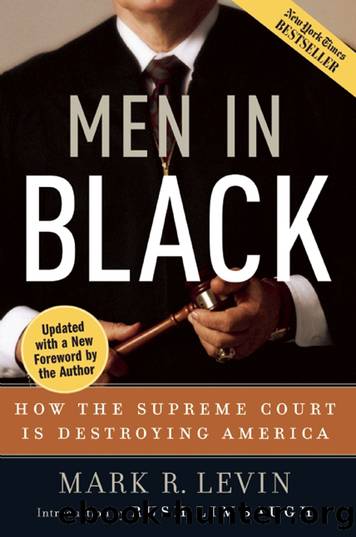Men in Black: How the Supreme Court Is Destroying America by Mark R. Levin

Author:Mark R. Levin [Levin, Mark R.]
Language: eng
Format: epub
Tags: Political Science, Political Ideologies, Conservatism & Liberalism
ISBN: 9781596980327
Google: kAKGCgAAQBAJ
Publisher: SimonSchuster
Published: 2006-09-25T20:30:33+00:00
Lincolnâs suspension of the writ of habeas corpus was eventually challenged by John Merryman, a secessionist and citizen of Maryland. The case reached the Supreme Court, where the chief justice was Roger B. Taney (author of the 1856 Dred Scott decision upholding slavery). In Ex parte Merryman, Taney, writing for the Court, held that only Congress could suspend the writ of habeas corpus.46 Lincoln ignored the opinion. In 1863, Congress passed a statute authorizing Lincoln to suspend the writ.47
Obviously, President Bush hasnât imprisoned or exiled members of Congress or state legislators who oppose his handling of the war on terrorism. Indeed, he hasnât taken any actions to silence his critics. The Bush administration has detained only two U.S. citizens, and then only for overt acts of war.48
On February 19, 1942, during World War II, President Franklin Roosevelt issued Executive Order 9066, which directed military commanders to designate areas âfrom which any or all persons may be excluded.â49 While the order didnât apply specifically to a particular ethnic group, its effect was clear. Tens of thousands of Japanese Americans and Americans of Japanese ancestry were systematically removed from their homes in western coastal regions and forced into internment campsânot because of any evidence of criminal or disloyal behavior, but because of their race.
The president has not issued an edict rounding up, say, law-abiding Islamic and Arab Americans, or Americans of Arab ancestry, forcing them into guarded camps where the government could watch over them. In fact, the administration is loath to give special scrutiny to aliens who travel to the United States even from countries known to harbor or tolerate terrorists, including the home countries of the September 11, 2001, terrorists. For the Supreme Court to intervene in the Hamdi and Rasul cases, and use them as vehicles to usurp the commander in chiefâs role despite the presidentâs restraint, is indefensible as a matter of law and policy. Thanks to the Supreme Courtâs ruling, in July 2004, the detainees at Guantanamo Bay were informed they could use American courts âto contest their detention.â50
It is difficult to win a war when the enemy is armed not only with rifles and rocket propelled grenades, but also with subpoenas, affidavits, and lawyers. And itâs difficult to maintain a republic when the judiciary abuses its constitutional authority. These cases illustrate perhaps more than any others just how dangerous and reckless an unbridled judiciary can be, not only to the Constitution, but to our national security.51
Download
This site does not store any files on its server. We only index and link to content provided by other sites. Please contact the content providers to delete copyright contents if any and email us, we'll remove relevant links or contents immediately.
The Secret History by Donna Tartt(19083)
The Social Justice Warrior Handbook by Lisa De Pasquale(12190)
Thirteen Reasons Why by Jay Asher(8907)
This Is How You Lose Her by Junot Diaz(6885)
Weapons of Math Destruction by Cathy O'Neil(6279)
Zero to One by Peter Thiel(5798)
Beartown by Fredrik Backman(5751)
The Myth of the Strong Leader by Archie Brown(5507)
The Fire Next Time by James Baldwin(5440)
How Democracies Die by Steven Levitsky & Daniel Ziblatt(5218)
Promise Me, Dad by Joe Biden(5153)
Stone's Rules by Roger Stone(5087)
A Higher Loyalty: Truth, Lies, and Leadership by James Comey(4959)
100 Deadly Skills by Clint Emerson(4924)
Rise and Kill First by Ronen Bergman(4785)
Secrecy World by Jake Bernstein(4751)
The David Icke Guide to the Global Conspiracy (and how to end it) by David Icke(4717)
The Farm by Tom Rob Smith(4506)
The Doomsday Machine by Daniel Ellsberg(4489)
